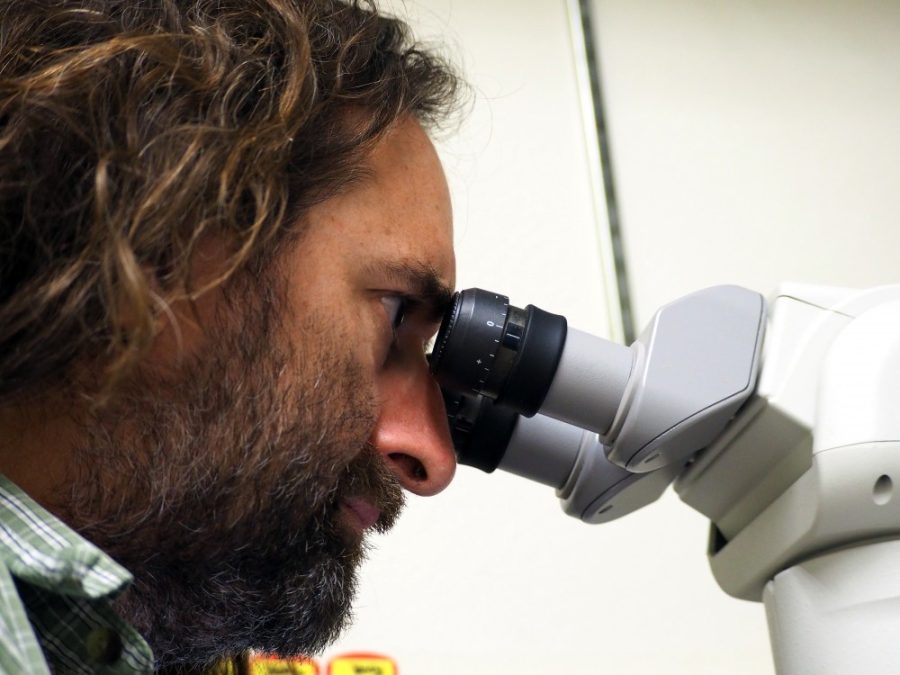UA researcher Keith Maggert wants to change the way you think about epigenetics.
With a recent grant from the National Institutes of Health (NIH), he plans to further investigate a theory that has the potential to redefine the way scientists study epigenetics. The grant is a five-year Transformative Research Award totaling $1.7 million, according to UA News.
“I hope to show that transgenerational epigenetic effects are actually caused by genome damage—it’s not epigenetic, it’s actually uncharacterized genome damage,” Maggert, an associate professor of cellular and molecular medicine and a member of the Cancer Biology Program at the UA Cancer Center, said.
RELATED:Dr. William Cance hired to lead University of Arizona Cancer Center in Phoenix
What exactly are epigenetics, though?
Cells have the ability to respond to their environment, Maggert said. If a stimulus such as temperature is applied to the environment, the cell will induce itself to change, turning on a set of genes to cope with the input. These genes sometimes, though, remain turned on after the stimulus has been removed. In some cases, these genes can transcend generations, a concept known as transgenerational memory.
“There’s these ideas that this epigenetic memory can be transgenerational—that is, it can affect a generation but then the children are the ones who also share in that increased disease risk or increased susceptibility to all sorts of things,” Maggert said.
Maggert’s research challenges a fundamental belief in epigenetic study. For years, the majority of scientists have believed that an additional layer of information on top of the chromosomes directed whether the genes turned on or off, Maggert said. But in the course of his studies, Maggert realized that may not be the case. Maggert believes there is no layer on top of the DNA—instead, his research has shown that epigenetic changes in cells cause damage to the genome.
“We just thought that these areas of the genome were totally quiet or didn’t do anything interesting,” Maggert said. “What my work is showing is that when a cell is stressed in a way to induce transgenerational inheritance, those regions of the genome are also damaged.”
This is a bold step for Maggert, whose research enters uncharted territory in the study of epigenetics. Before, scientists focused their research on the idea that epigenetics had three phases: establishment, maintenance and interpretation. He argues that if researchers continue to work under this model, they will never be successful.
“This idea of establishment, maintenance and interpretation is totally wrong, and if we go into the experiments with this in mind, then we’re not even looking at the most obvious explanation,” Maggert said.
RELATED: UA professors receive grant for breast cancer research for Latinas
Continuing down this line of research may even have detrimental effects, according to Maggert. If scientists develop drugs that affect epigenetics at those genes, they could actually end up doing more harm than good. He said that while epigenetic drugs have experienced some positive results in the treatment of diseases such as leukemia, the majority of the results are underwhelming.
According to an article in UA News, many illnesses, including metabolic diseases such as cancer and diabetes, are thought to be caused by epigenetics. If Maggert’s research is correct and epigenetic defects do originate in the genome, then detecting epigenetic effects may become much easier.
“First of all, we need to avoid doing things that could cause more damage, but then we could also focus on what the actual contributors to those diseases are,” Maggert said.
For Maggert, the timing was right. Many scientists in the field had become dissatisfied with the ineffectiveness of the existing models, he said.
The first few times he proposed his ideas, they were largely unaccepted by the scientific community. But now, after 20 years, scientists are beginning to seriously consider his theories. Researchers are now at the point where the existing mindset is just not working, Maggert said.
The majority of NIH grants are awarded to researchers studying the traditional model of epigenetics, making Maggert an exception to the norm.
“This kind of grant is very unusual and pretty hard to get,” Maggert said. “NIH doesn’t expect there are many fields of study that are as mature as epigenetics that are going to have somebody come in and say, ‘This is very different than the way we’re thinking of it.’ ”
Maggert plans to test his ideas using experiments on fruit flies and human cells. He will spend the next five years using the grant to further his research in demonstrating his theories.
Follow Hannah Dahl on Twitter.









